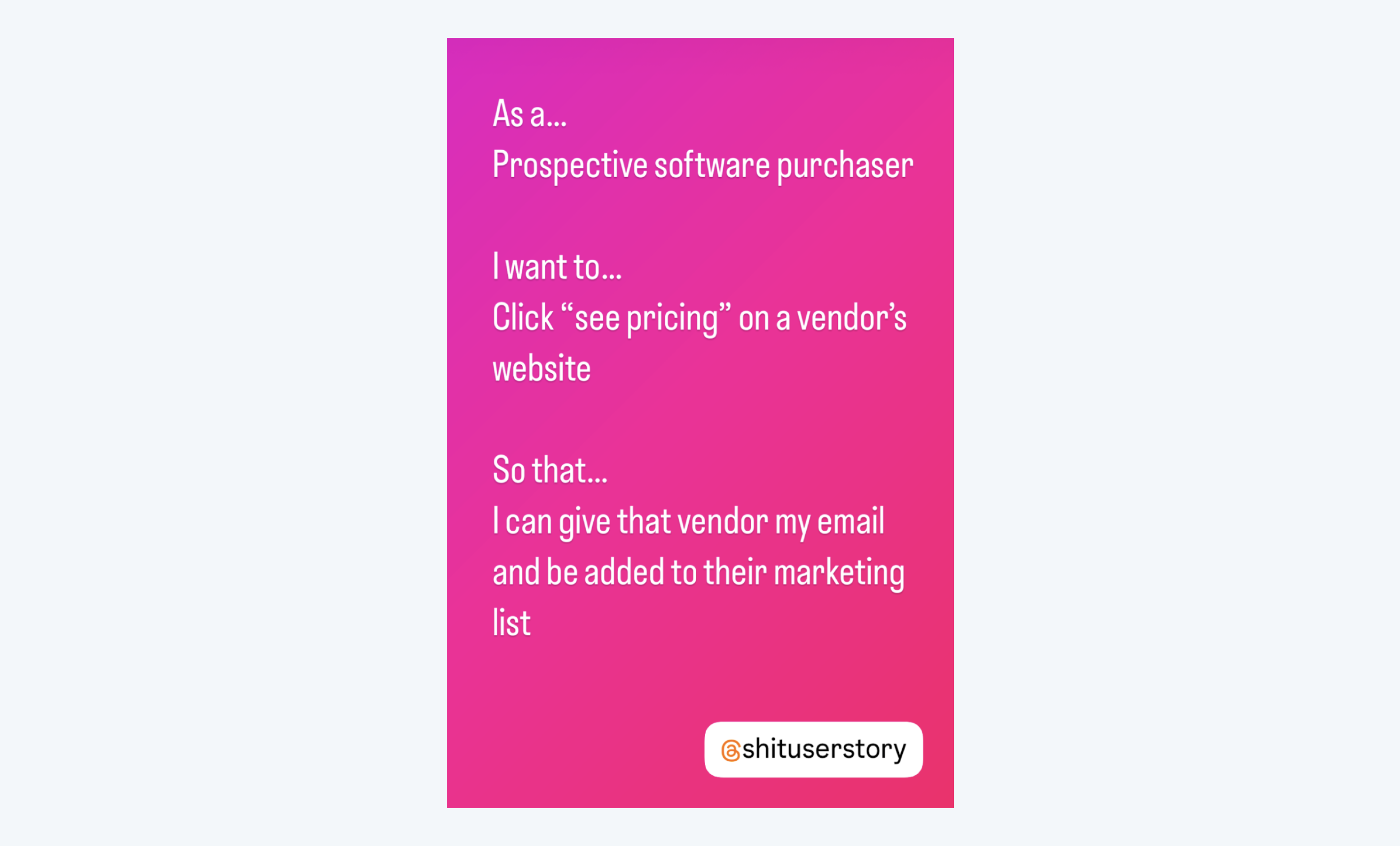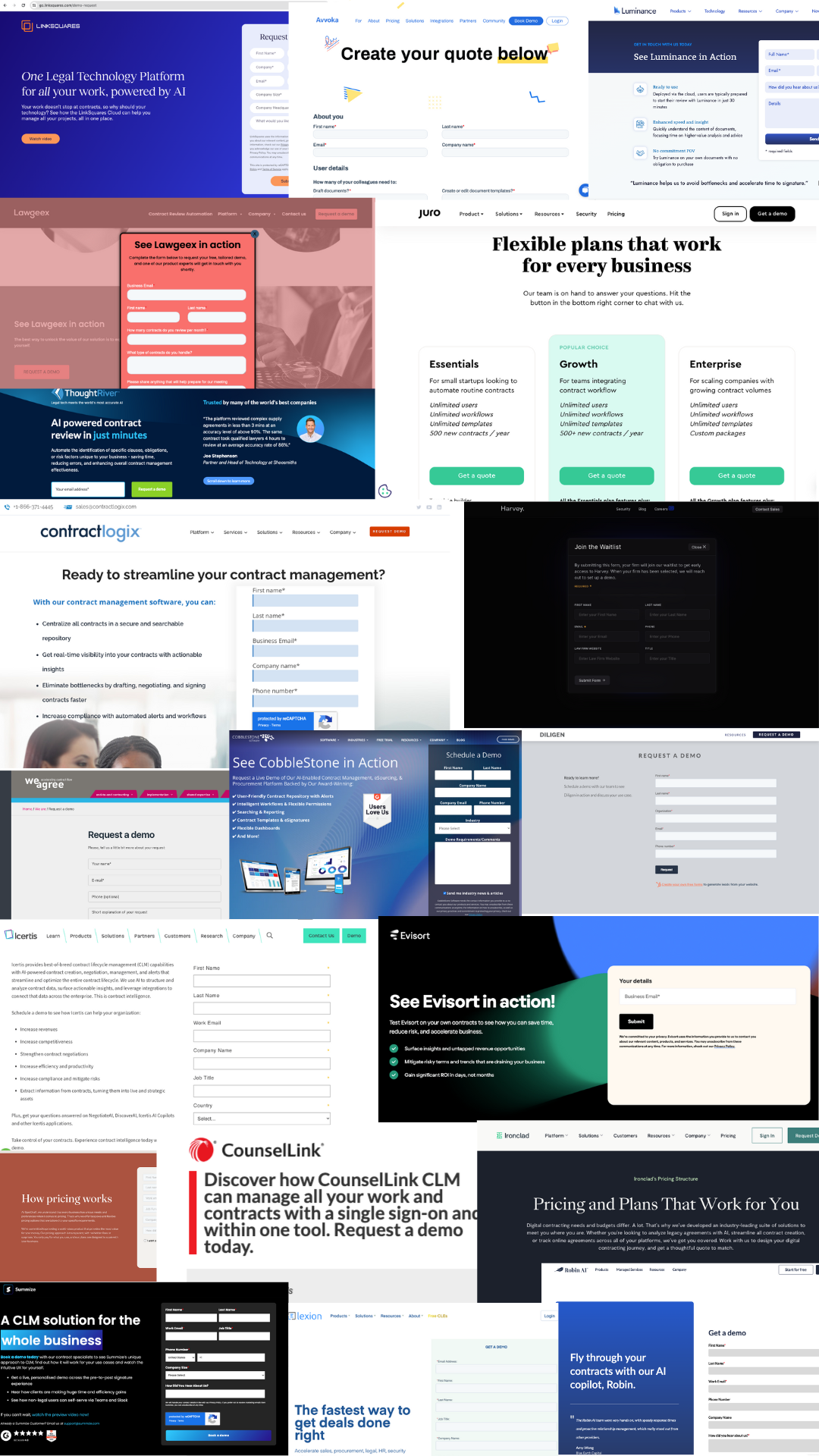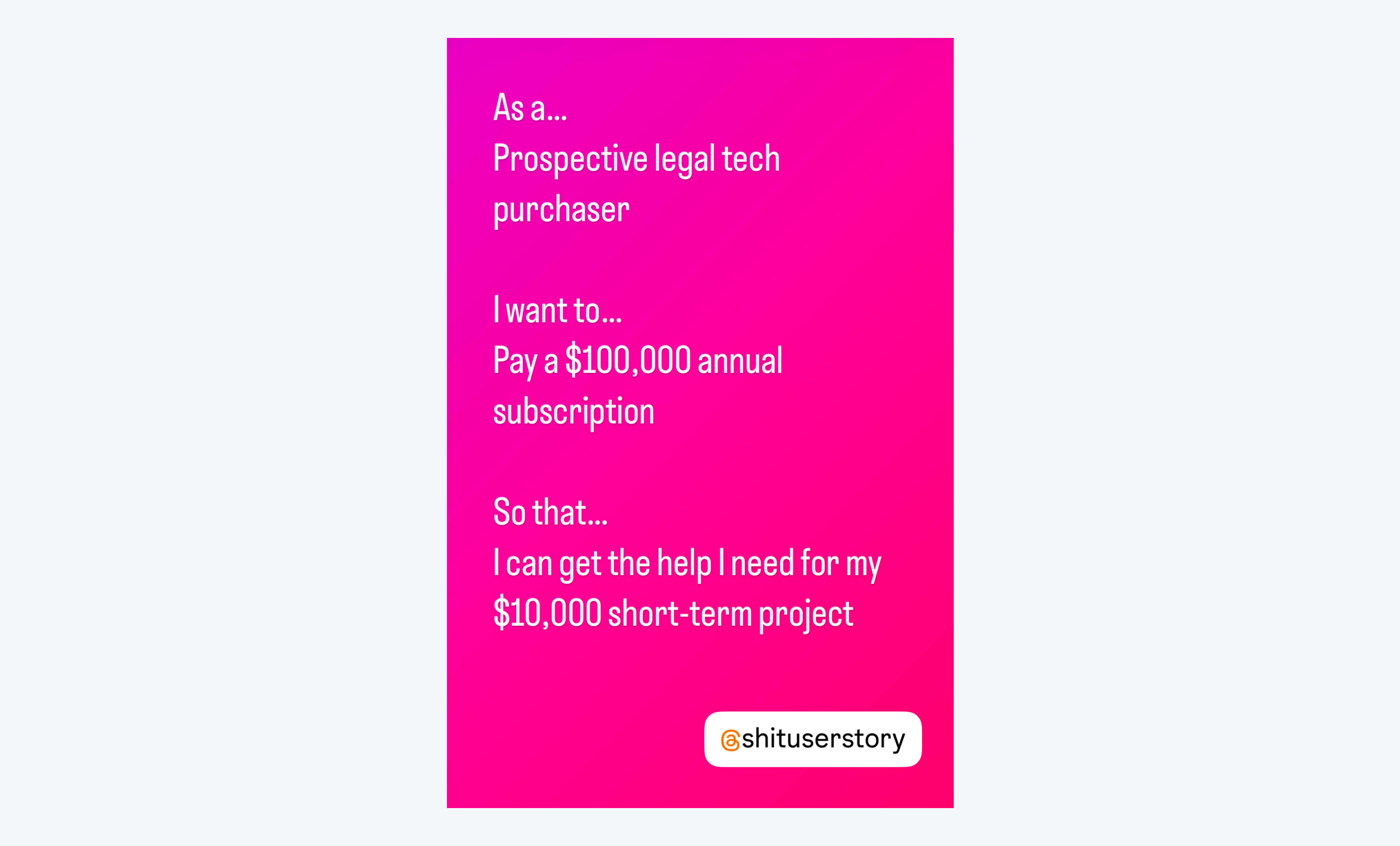
This isn’t a real Shit User Story, but one we made up, inspired by the stories we see on their social media pages.
In our first “Talk to Sales” article, we outlined some data on what the current reality of the buyer journey for contracts tech looks like.
A reminder of our findings
Today, most legal tech software purchases have the making of a Shit User Story.
We reviewed 130 contract tech websites:
- 75% (98/130) required a sales conversation for a trial . The remaining 25% of vendors (32 companies) allowed prospects to try their product via self-serve online signup.
- 72% (94/130) of vendors do not share any pricing information on their website
. Prospects have to speak to sales to get an idea of costs.
- Of the 28% (36 companies) with any pricing on their website, there was a mix between ones that shared all pricing and ones that only had pricing for smaller customers (with enterprise customers having to talk to sales).
- 17 of the 36 who show pricing information only show details on what you can get with a free account, what a small company has to pay for, and sometimes what a medium-sized company has to pay for (with differences in how those categories are defined). Enterprise customers always have to talk to sales.
- 19 (15% of the 130 total) show pricing for customers of all sizes.
- Of the 28% (36 companies) with any pricing on their website, there was a mix between ones that shared all pricing and ones that only had pricing for smaller customers (with enterprise customers having to talk to sales).
- 0/130 vendors we saw (apart from Zuva!) offered pay-as-you-go pricing . Sign up was for subscription only.

Here’s a very underinclusive collage of some “Talk to Sales” messages we encountered.
Why these findings matter
Lack of transparency creates friction in the sales process for prospective buyers. Customers need information, and the more time they have to spend looking for it, the less solutions they can review, and the less likely they are to find their perfect match.
If a prospective customer goes into a research effort trying to walk away with a list of vendors to consider, but every vendor tells that prospect to “talk to sales” to find out any pricing information, it can be easy for that customer to feel frustrated and end up stalled in their buying process.
With dozens, or even hundreds, of potential solutions to consider, requiring a sales conversation before knowing whether a product is worth a closer look, or even what that product might cost, creates a difficult buyer experience.
Let’s say our same prospect selects five vendors to talk to based on their research. That prospect still does not know pricing (so they cannot set a budget), and only know what vague marketing materials say each product can do.
It’s entirely possible that this prospect leaves those five demos (likely an hour each) still without pricing information, because the vendor needs a follow up conversation to provide pricing, or the prospect isn’t certain of their document totals, user needs, etc.
It can take multiple conversations with a vendor to get a true sense of budget, even a budget range, and it can be disappointing to the prospect if they’ve spent hours talking to a vendor only to find out that their product is out of that prospect’s price range.
What a waste. It doesn’t have to be this way.
Subscription or bust

Another one we made up. Thanks for the inspiration, Shit User Stories!
Sometimes prospects have an ongoing problem. They need a CLM. They negotiate 20 NDAs and 10–15 license agreements a month. They have recurring questions about what their contracts say. Sometimes, they just have a one-off project. Or, even though they have recurring projects (e.g., they’re a serial acquirer), they only have easy access to project-based budgets. A subscription needs to come out of their tight legal tech budget, as opposed to their hefty transaction budget.
Not only that, but it can sometimes be hard for buyers to estimate their ongoing need, and a subscription can compel them to over- (or under-) buy.
For buyers that have an ongoing, forecastable need, contracts tech vendors are happy to oblige. Not so much if they’d like to buy one-off. Does anyone think that >90% of the need for contracts tech is recurring? Or are vendors only offering subscriptions for their own reasons?
Again, it doesn’t have to be this way.
Why this happens and what it means
We have a lot of sympathy for less transparent vendors, and ones who try to force subscriptions.
There are legitimate reasons why legal tech companies would want you to talk to sales.
Sales conversations are fantastic for building relationships and gathering feedback on product and sales processes. Vendor sales teams yearn to talk to prospects. They seek to discover their needs, to pitch their offerings to them most effectively, and to price based on value and ability to pay.
It’s harder for those sales teams to be available only when people want to speak to them, to price based on static information instead of dynamic context, and it’s harder still for legal tech companies to gain insight into who their customers are and how their product is (or is not) serving their needs when a conversation with sales hasn’t happened as a first step.
There are also legitimate reasons for why legal tech companies would only offer subscription pricing models.
Subscriptions mean consistency. Subscriptions mean confirmed, quantifiable revenue, and that’s easier for vendors to work with. They can set sales goals and celebrate when they exceed those goals. They can ensure that their products are available to customers year-round and have customers available to them for year-round feedback.
The reality, though, is that customer needs and customer interest may not always match what the vendor wants or expects.
It’s frustrating to have to speak to every vendor you’re researching.
It’s disappointing to have to pay for an annual subscription when your need is short-term and project-based.
Today, the legal tech buying process is disappointing.
To us, the future is transparency. It just may take some time to get there.
While you wait, you can always talk to sales.